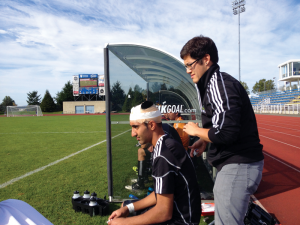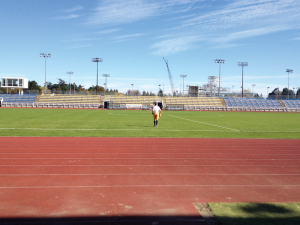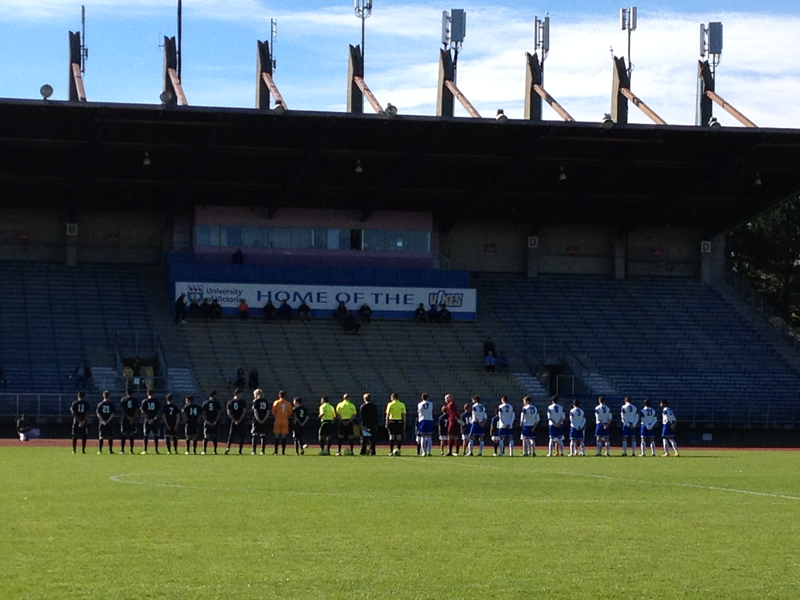By Paul Esau (The Cascade) – Email
Print Edition: October 9, 2013
It’s about 8 p.m. on a Saturday night, and UFV soccer coach Alan Errington and I are huddled over a four-person table at Victoria’s Bard & Banker. To my right is team manager John Werrel, and across from me is physical therapist Tyler Ker. The three of us are mostly quiet as we concentrate on listening to Alan’s voice through the kaleidoscope of weekend pub din and live music. Privately, I’m trying to find a menu item within my price range, but Alan’s made me laugh so often I’ve forgotten what I’m looking for.
Alan Errington is one of the old breed. He remembers 1986, Canada’s one and only appearance in the World Cup, and keeps hundreds of stories ready behind his Newcastle accent. He coached the national team with Bob Leonarduzzi from ’88 to ’96, the Whitecaps before that, and a good half-dozen teams since. Sometimes he tells the good stories, of jokes on the pitch and pranks in the locker rooms, tales of piss-drunk professionals urinating in hotel lobbies, and inside jokes from squads long disbanded. He claims that neither the refs nor the players have the same sense of humour they used to, and I don’t doubt it while listening to him.

Sometimes Errington tells the bad stories, of the times he handed out Canada pins at Olympic functions while other nations traded in track suits and lobster dinners, or why Canadian men’s soccer is falling into mediocrity after two decades of decline. Here he becomes serious and leans across the table, intense in his frustration.
Somewhere between the tortilla chips and the cod chowder, Tyler asks him why Canadian soccer is so underdeveloped, and Errington’s forehead tightens. “One word: league,” he says, “Name me another country that doesn’t have its own professional league!”
Tyler and I think about it. “Croatia,” he says, wrong on his first try. I think about saying Japan, but catch my mistake. “Turkmenistan,” I venture.
Errington looks at me, and I think I’ve stumbled onto something (I later find a national premier league on Google). “The players need somewhere to play,” Alan says, “Without a league, Canada will never get back to the World Cup.”
He makes his argument, quoting sources, citing experiences, arguing passionately for a future he obviously doesn’t believe will happen. Then Tyler asks him why the Cascades don’t play with a sweeper, and he’s off on a different, more positive subject, as John and I finish the chips.
The 18-man Cascades travelling squad, plus all of us at The Bard & Banker, are in Victoria to avenge the team’s Friday loss to the UVic Vikes by a score of 1-0. The team has had a poor record against UVic in recent years, but UFV is tantalizingly close to a playoff spot and they know it. It’s in their eyes and the back of their minds – the hope that this year will be the year the Cascades make their first CIS playoffs.
Mark Village is UFV’s fourth-year goaltender and the foundation of the Cascades’ post-season hopes. The 2012 Canada West All-Star is also finishing minors in both criminology and history, which makes him a man close to my own heart.
“I love history, I really do,” the usually enigmatic goaltender admitted as we rode the bus towards a Saturday ferry, “but I think there are just more options in crim.” He’s one of several players pursuing subjects unusual among varsity athletes, including three players majoring in the sciences.
The odds were not with Village in Victoria. After claiming a one-to-nil lead in first half injury time, the Cascades surrendered five goals in the second. For a goaltender that averaged 1.25 goals against last season, it was a humiliating and angry experience. Village made a dozen spectacular saves throughout the game, and yet it was the first tally, the one he seemed to drop into the net, which haunted him.
It was not a game UFV was supposed to lose 5-2; a loss was not part of the narrative. It was a game Errington started in high spirits, tossing jibes at his opposing coach (and friend) Bruce Wilson as the Canadian legend lofted balls across the field.
“Why don’t you take some strikes of your own?” I asked Errington during a lull in the warm-up. “Can’t let Wilson show you up.”
“Oh Bruce? That’s my grandfather!” Alan said, waving a hand dismissively. “Don’t want to dishearten the lad!”
Errington has a retort for everything, a way with words as formidable as his conditioning sessions. I watched Wilson gather in his team, and made a cautious foray of my own. “If you used to play a game as quality as the one you talk now,” I said, “You must have been some player.”

Alan smiles, letting my cheek slide. “I’m the best ****ing player I’ve ever been,” he says, “The way I tell it, I get better every year.”
The sun is shining, and UVic has one of the best fields in the CIS. Alan stays in a good mood until a wretched 15-minute span in the second half, during which the Vikes score three goals and the game slips suddenly beyond his team’s grasp. After that he’s on fire, and assistant coach Tom Lowndes pulls me aside after the final whistle.
“You’ll need your earmuffs in the change room,” he warns, meaning what’s coming can’t be printed.
Soccer is a strange game. Twenty-two men on a field, and yet somehow 11 win, and another 11 lose. It’s never simply one mistake, never simply one failure, and yet to each Cascade it seems that he alone might be directly responsible. Village sits with his head in his hands; the change room stinks of frustration.
“They threw in the towel,” Errington says, jaw clenched. He scrutinizes me, the veteran of decades of playing and coaching studying the university journalist.
“What did you think?” he asks.
I’m honoured, but I don’t know what to say.



